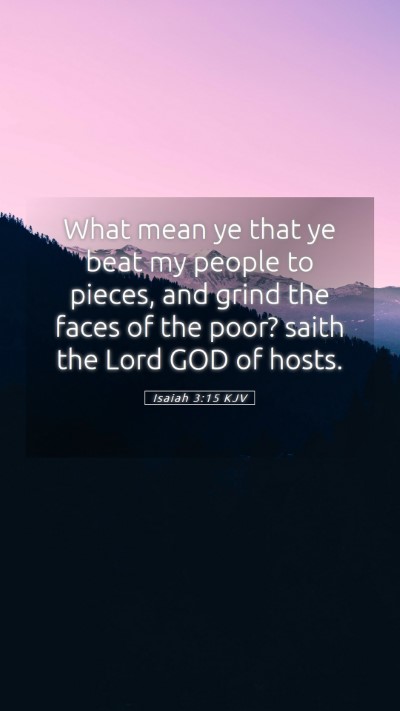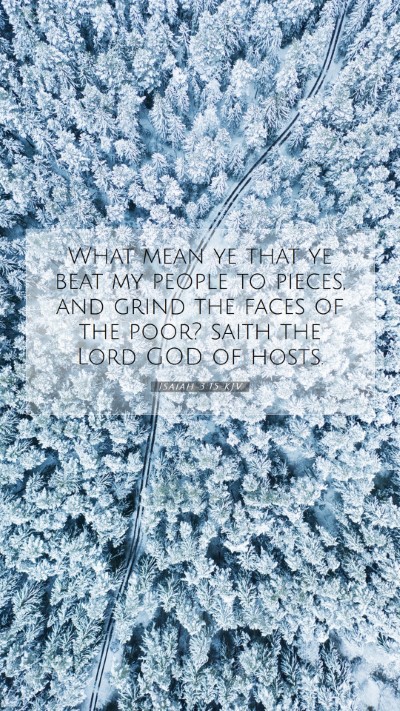Understanding Isaiah 3:15
Isaiah 3:15 states: “What do you mean by crushing my people, by grinding the faces of the poor?” declares the Lord, the Lord Almighty.
Bible Verse Meanings and Interpretations
The verse from Isaiah presents a divine accusation against leaders and those in power who exploit and oppress the vulnerable in society. It reveals God's deep concern for justice and the treatment of the poor, symbolizing His character as a protector of the weak.
Contextual Background
Isaiah prophesied during a time of moral decline in Israel, where corruption and social injustices were rampant. This social injustice is highlighted as the rulers and leaders oppressed the common people, particularly the poor and defenseless.
Key Themes in Isaiah 3:15
- Divine Justice: God questions the oppressors, showing that He is aware and will hold them accountable for their actions.
- Oppression of the Poor: The imagery of “grinding the faces of the poor” illustrates the severity of the exploitation faced by the marginalized.
- God’s Advocacy: God stands as an advocate for the poor, emphasizing the importance of compassion and justice in society.
Bible Verse Commentary
Insights from Matthew Henry
Matthew Henry emphasizes that the Lord's anger is directed towards those who engage in oppression. He notes that the act of “crushing” signifies a ruthless disregard for human dignity. The focus on God's question highlights the seriousness of the leaders' actions against the innocent.
Insights from Albert Barnes
Albert Barnes elaborates that this verse is a poignant reminder of the accountability leaders have towards their people. He points out that the language used conveys God's indignation towards those who abuse their positions of power. He also connects this oppression with moral decay within the society.
Insights from Adam Clarke
Adam Clarke reflects on the societal implications of oppression depicted in the verse. He asserts that such treatment of the poor is a direct affront to God's authority. Clarke also notes the linguistic choices in the verse depict the weight of the leaders' sins against both the people and God.
In-Depth Bible Verse Analysis
Exploring Isaiah 3:15 through Biblical exegesis reveals layers of meaning and applications for today's believers. The verse serves not only as a historical account but also as a warning to current societies about the treatment of the disenfranchised.
Application of Scripture
This verse can be applied to modern contexts where inequality persists. It calls attention to the ethical responsibilities of leaders and citizens to care for the less fortunate, reinforcing the notion that God mandates justice and compassion.
Related Bible Cross References
- Proverbs 14:31 – "Whoever oppresses the poor shows contempt for their Maker..."
- Isaiah 10:1-2 – "Woe to those who make unjust laws..."
- Luke 16:19-31 – The rich man and Lazarus, highlighting the plight of the poor.
- James 5:1-6 – A warning against the rich oppressing the poor.
- Micah 6:8 – “He has shown you, O mortal, what is good...” referring to justice, mercy, and humility.
Bible Study Insights
For Bible study groups and individuals engaging in online Bible study or utilizing various Bible study tools, Isaiah 3:15 serves as a critical teaching about the importance of social justice, urging believers to consider how their actions affect the less fortunate.
Discussion Points for Bible Study Lessons
- What does this verse reveal about God's character and His expectations for His people?
- How can we apply the lessons from Isaiah 3:15 in today's society?
- What responsibility do we have as individuals and leaders to ensure justice for the oppressed?
Conclusion
Isaiah 3:15 is a sobering reminder that God demands justice and compassion for the poor. The interpretations provided by various biblical scholars underscore the timeless relevance of this scripture in guiding both personal and societal ethics. The verse implores believers to stand against injustice and to advocate for those who cannot advocate for themselves.


